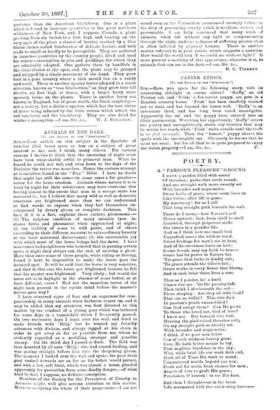ANIIIIA.LS IN THE DARK.
130 THE EDITOR OF THZ SPECTATOR.") SIR,—Your article on this subject in the Spectator of October 23rd bears more or less on a subject of great interest to me, and, I think, many others. For various reasons I incline to think that the oncoming of night must have been unspeakably awful to primeval man. What he feared he could not tell, and even down to the days of the Psalmist the terror was nameless. Hence the curious attempt at translation found in the " Bug " Bible. I have no doubt that night has still the same—in some cases a far greater— terror for the brute creation. Animals whose nature it is to hunt by night for their subsistence may have overcome this feeling almost to the extent that man in a savage state has mastered it; but I believe that many wild as well as domestic creatures are frightened more than we can understand or find words to express when they feel themselves en- compassed by dreary gloom or complete darkness. This fact, if it is a fact, explains three curious phenomena :— (1) The helpless condition of many animals (yon in- stance fowls and pheasants) when approached at night;
(2) the liability of some to wild panic, and of others (according to their different natures) to extraordinary ferocity at the least nocturnal disturbance; (3) the unutterable joy with which most of the lower beings hail the dawn. I have sometimes had neighbours who believed that in passing certain spots at night they always ran the risk of meeting a ghost. More than once some of these people, while riding or driving, found it next to impossible to make the horse pass the haunted spot. It will be said that the horse is very sensitive, and that in this case the horse got frightened because he felt that his master was frightened. Very likely ; but would the horse act so in daylight in the absence of some better, or at least different, cause P Had not the nameless terror of the night been present to the equine mind before the master's nerves gave way P
I have observed signs of fear and an eagerness for com- panionship in many animals when darkness comes on, and it may be added that my attention was first directed to this matter by the conduct of a young goat which was tethered for some days in a tennis-field which I frequently passed. On two successive days I leant over the wall and tried to make friends with Billy,' but he treated my friendly advances with disdain, and always tugged at his chain in order to get away as far as possible from me, whom he evidently regarded as a meddling stranger and possible enemy. On the third day I passed at dusk. The field was then deserted by all save Billy,' who had ceased feeding, and was gazing straight before him into the deepening gloom. The moment I looked over the wall and spoke, the poor little goat rushed towards me as far as his tether would permit, and with a low, soft bleat, which was almost a moan, pleaded apparently for protection from some deadly danger,—of what kind he had, I suppose, no definite conception.
Members of the Society for the Prevention of Cruelty to Animals might well give serious attention to this matter. Without accepting the whole of their programme—I am not
sound even on the Vivisection question—I strongly believe in the duty of preventing cruelty which is needless, useless, and preventable. I am fully convinced that many kinds of animals, when left without any light or companionship through the night, undergo a degree of suffering greater than is often inflicted by physical torture. There is another matter referred to in your article which suggests a question. How would the world look if we could see without light ? It must present something of this appearance, whatever it is, to animals that can see in the dark.—I am, Sir, &c.,
H. C. TIERNEY.






































 Previous page
Previous page